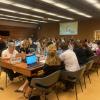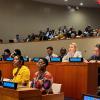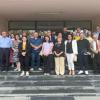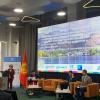Media
South Sudan, the world’s newest nation and a landlocked country in Eastern Central Africa, is situated in the middle of the basin of the Nile River, Africa’s longest river. Sharing significant transboundary wetlands, experiencing annual catastrophic floods and droughts and facing immense…
Civil society plays a vital role in addressing major environmental challenges. To fully harness this potential, ongoing efforts are essential to uphold the public rights to promote effective and inclusive environmental governance and a clean, healthy and sustainable environment.
To tackle these…
Taking part in the High-Level Political Forum on Sustainable Development in New York (8 – 17 July), UNECE Executive Secretary Tatiana Molcean presented UNECE regional perspectives on SDGs localization, climate action, energy, transport, water and engaged with civil society, youth, and the private…
As Europe advances towards a green and digital economy, the demand for Critical Raw Materials (CRMs) - such as lithium, nickel, rare earth elements and cobalt - is surging. The European Critical Raw Materials Act (CRMA) aims to secure stable and resilient CRM supply chains by setting benchmarks…
Technological advances have brought down the C02 emission intensity of GDP in the UNECE region by 31% from 2010 to 2020. But progress on climate action remains far too slow. Each one of the past twelve months has been the hottest such month on record. The cost of extreme weather events, such as…
The shift towards the digital exchange of trade data and documents can improve efficiency, reduce costs, enhance transparency, and enable better accessibility to and analysis of data. Furthermore, it has the potential to foster greener and more inclusive trade. Yet, efforts to digitalize data and…
Recent data from the UNCTAD Global Trade Update reveals a promising outlook for global trade. Following a decline in the last year, the volume of world merchandise trade is forecast to increase by 2.6% in 2024 and 3.3% in 2025. One of the most notable trends in 2024 is the significant rise in…
Mapping air pollutant emission sources in a country helps experts and decision-makers identify the most effective policies. Understanding the regional distribution of emissions is crucial for effective policy implementation.
Spatially allocating—or gridding—emissions is technically challenging.…
The potential of the creative economy to drive sustainable and resilient economic growth is high on the agenda of the participating States of the United Nations Special Programme for the Economies of Central Asia (SPECA), i.e., Afghanistan, Azerbaijan, Kazakhstan, Kyrgyzstan, Tajikistan,…
The 2024 UNECE Sustainable Development Goals (SDG) Progress Report shows that the UNECE region is far off-target when it comes to meeting commonly agreed SDG indicators. Spanning across Europe, North America, the Caucasus and Central Asia, Türkiye and Israel, the region is currently on track to…











